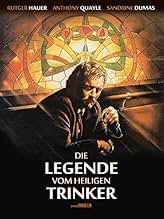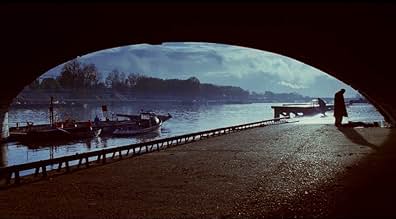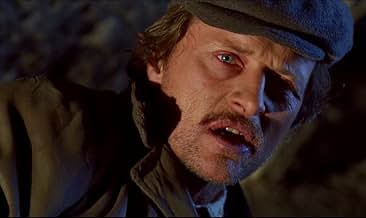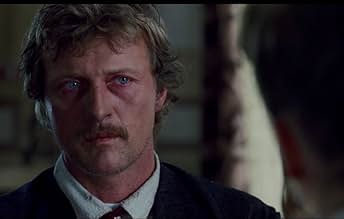IMDb RATING
7.1/10
2.4K
YOUR RATING
An alcoholic homeless man is given two hundred francs by a stranger, who requests that when he can he will return the money to Saint Therese in the cathedral.An alcoholic homeless man is given two hundred francs by a stranger, who requests that when he can he will return the money to Saint Therese in the cathedral.An alcoholic homeless man is given two hundred francs by a stranger, who requests that when he can he will return the money to Saint Therese in the cathedral.
- Director
- Writers
- Stars
- Awards
- 12 wins & 3 nominations total
Francesco Aldighieri
- Policeman
- (as Franco Aldighieri)
- Director
- Writers
- All cast & crew
- Production, box office & more at IMDbPro
Featured reviews
This tale of a tramp who is the recipient of the milk of human kindness but who finds it difficult to repay the goodness shown to him is typical of its director, Ermanno Olmi, but whereas other Olmi films deal with the common-place with an uncommon beauty this tale of the mystical is overtly simplistic. "The Legend of the Holy Drinker" is visually superb and we should expect nothing less from an Olmi picture but it is also very dry, very dull and very unevenly acted, (the partial dubbing of its international cast certainly doesn't help).
As the tramp Rutger Hauer staggers around looking a little too bewildered at what's happening to him and the supporting cast are fundamentally just bit players in his far from interesting story. The Stravinsky score also sits somewhat uneasily on proceedings. Some people think this is a masterpiece while others have simply dismissed it. Personally I found it a crashing bore.
As the tramp Rutger Hauer staggers around looking a little too bewildered at what's happening to him and the supporting cast are fundamentally just bit players in his far from interesting story. The Stravinsky score also sits somewhat uneasily on proceedings. Some people think this is a masterpiece while others have simply dismissed it. Personally I found it a crashing bore.
Olmi is one of Europe's last Old Masters in the art of film making. He is usually regarded as a belated neo-realist, but after you've seen "The Legend of the Holy Drinker", you will realize the label simply does not stick. This is a film about spirituality, about communion, one of the most deeply religious movies ever, whose only rivals might be Dreyer's "Ordet" or Bergman's rather pretentious "faith trilogy" ("Through a Glass Darkly", "Winter Light" and "The Silence"). However, you will not find Scandinavian mists or angst in Catholic Olmi's adaptation of the beautiful novella written, oddly enough, by a great Jewish novelist, Joseph Roth. Wine is a metaphor for life, and Paris is a metaphor for our urban world. In this symbolic universe, it takes a great actor to give flesh and blood to the character of Andreas, the holy drinker, a beggar endowed with an amazing sense of dignity. Rutger Hauer was the man for the job: this was his best performance: he was never better, and, to judge from the course his career has taken, I fear he will never be better than in this film. It is not a thriller, but it is thrilling. It takes its own leisurely pace, but goes very far, very deep indeed into the human soul. After so many insipid or unpalatable cinematic concoctions, treat yourself to this film: it truly is vintage stuff.
10duinnuk2
This simple tale is told at a pace which allows the audience time to reflect within the context of the moral challenges it presents. The result is a level of engagement far superior to the gamut of empty sophistication in the movie world. One is able to explore the implications of the actions and decisions of Hauer's character without leaving the narrative - there is no pressure for post viewing reflection when the spell of the film is broken and thought is coloured by a context inappropriate to the narrative. Here is a complete experience - moving, profound and visually beautiful - if only Hollywood could produce cinema of this standard.
This film embraces everything that contemporary Hollywood cinema is so afraid of - intelligence, moral complexity, and rich characterisation. It is a simple tale really - an alcoholic vagrant in Paris is lent 200 francs by a stranger, on condition that he repays it to a local chapel when he can afford it. But what makes this an extraordinary film is the manner in which we are drawn so completely into this seemingly trivial and futile quest. This is principally down to Rutger Hauer's towering performance as the haunted, suffering tramp, who has to battle both ill-fortune and his own past to repay the debt and find peace. There is little in the way of either dialogue or action, yet Ermanno Olmi's vision of a timeless, enchanted Paris is dazzling. A lesson to others in how to tell a story on film.
Takeaway Scene
Rutger Hauer's biggest, joyful smile is for a bathtub.
The Good This is one of very few successful screen transpositions of an introspective literary work. The dialogue is sparse and in two languages but the film while making small adjustments here and there conveys all the internal monologue of Joseph roth's novella. Hauer. Probably his best performance (although I also like his understated character in lady Hawke). He is the icon of a getleman drunk. The photography. natural, unobtrusive, realistic. The cast: A very heterogeneous looking cast that manages to fit in well and act natural in their respective roles. The women: For a very Catholic director, Olmi is very kind to almost the women in the movie, including extras, and they look attractive without losing their real, unpolished authenticit
The Not So Good The film is almost real time,with long contemplative moments, to the point that sometimes the flashbacks have more action that the main scene. For all its photographical and acting beauty, the going can be slow, and watching Hauer drinking one longs to join in. I haven't counted them, but I suspect that matching the movie glass for glass would be lethal (especially the Cafe'-Calva followed by an Absinthe in the morning)
The Strange Hauer is a character living and dressing in the 1930s filmed in 1980s Paris. And it fits seamlessly, the same way that the real, surviving old bistrots and locations fit in their modern surroundings. Olmi has taken advantage of a phenomenon familiar to us all walking in cities and performed a sleight of hand trick, aided by the costume design of Ms. Marchand that emphasizes the continuity between periods to blend characters in.
The Good This is one of very few successful screen transpositions of an introspective literary work. The dialogue is sparse and in two languages but the film while making small adjustments here and there conveys all the internal monologue of Joseph roth's novella. Hauer. Probably his best performance (although I also like his understated character in lady Hawke). He is the icon of a getleman drunk. The photography. natural, unobtrusive, realistic. The cast: A very heterogeneous looking cast that manages to fit in well and act natural in their respective roles. The women: For a very Catholic director, Olmi is very kind to almost the women in the movie, including extras, and they look attractive without losing their real, unpolished authenticit
The Not So Good The film is almost real time,with long contemplative moments, to the point that sometimes the flashbacks have more action that the main scene. For all its photographical and acting beauty, the going can be slow, and watching Hauer drinking one longs to join in. I haven't counted them, but I suspect that matching the movie glass for glass would be lethal (especially the Cafe'-Calva followed by an Absinthe in the morning)
The Strange Hauer is a character living and dressing in the 1930s filmed in 1980s Paris. And it fits seamlessly, the same way that the real, surviving old bistrots and locations fit in their modern surroundings. Olmi has taken advantage of a phenomenon familiar to us all walking in cities and performed a sleight of hand trick, aided by the costume design of Ms. Marchand that emphasizes the continuity between periods to blend characters in.
Did you know
- TriviaRobert De Niro was approached for the role of Andreas Kartak, but he turned down the offer because he was not convinced about the project.
- Crazy credits"May God grant all of us, the drinkers, such a light and beautiful death". (Joseph Roth)
- ConnectionsFeatured in Het uur van de wolf: Rutger Hauer: Blond, blue eyes (2006)
- How long is The Legend of the Holy Drinker?Powered by Alexa
Details
- Release date
- Countries of origin
- Languages
- Also known as
- Die Legende vom heiligen Trinker
- Filming locations
- Production companies
- See more company credits at IMDbPro
Box office
- Gross worldwide
- $6,384
- Runtime
- 2h 8m(128 min)
- Color
- Sound mix
- Aspect ratio
- 1.85 : 1
Contribute to this page
Suggest an edit or add missing content

























